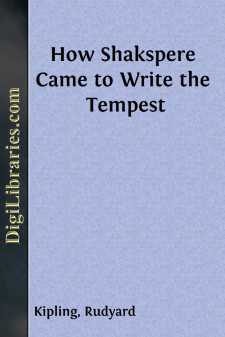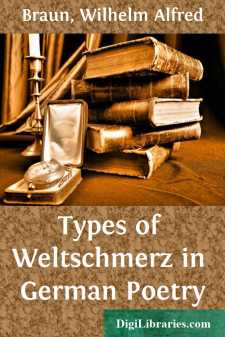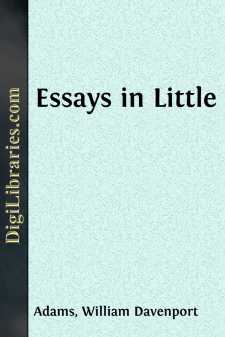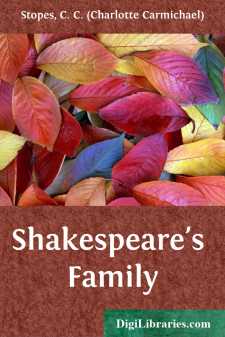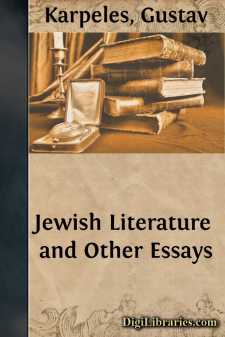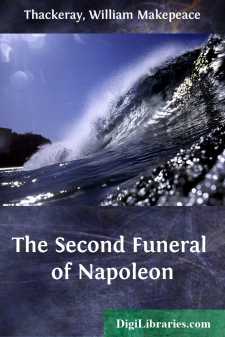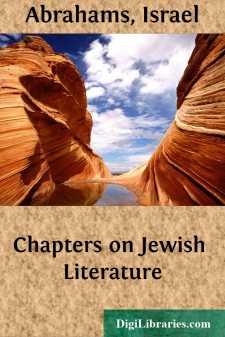Literary Criticism
- American 18
- Ancient and Classical 3
- Asian 1
- Australian & Oceanian 1
- Books & Reading 8
- Caribbean & Latin American 2
- Drama 2
- English, Irish, Scottish, Welsh 49
- European 7
- General 37
- Horror 1
- Humor 2
- Jewish 2
- Medieval 2
- Middle Eastern 3
- Poetry 7
- Renaissance 6
- Russian & Former Soviet Union 1
- Shakespeare 27
Literary Criticism Books
Sort by:
by:
Rudyard Kipling
INTRODUCTION Mr. Kipling’s brilliant reconstruction of the genesis of the ‘Tempest’ may remind us how often that play has excited the creative fancy of its readers. It has given rise to many imitations, adaptations, and sequels. Fletcher copied its storm, its desert island, and its woman who had never seen a man. Suckling borrowed its spirits. Davenant and Dryden added a man who had never seen a...
more...
CHAPTER I Introduction The purpose of the following study is to examine closely certain German authors of modern times, whose lives and writings exemplify in an unusually striking degree that peculiar phase of lyric feeling which has characterized German literature, often in a more or less epidemic form, since the days of "Werther," and to which, at an early period in the nineteenth century,...
more...
ALEXANDRE DUMAS Alexandre Dumas is a writer, and his life is a topic, of which his devotees never weary. Indeed, one lifetime is not long enough wherein to tire of them. The long days and years of Hilpa and Shalum, in Addison—the antediluvian age, when a picnic lasted for half a century and a courtship for two hundred years, might have sufficed for an exhaustive study of Dumas. No such study...
more...
SHAKESPEARE AND PRECIOUS STONES So wide is the range of the immortal verse of Shakespeare, and so many and various are the subjects he touched upon and adorned with the magic beauty of his poetic imagery, that it will be of great interest to refer to the allusions to gems and precious stones in his plays and poems. These allusions are all given in the latter part of this volume. What can we learn from...
more...
PREFACE When I was invited to reprint in book-form the articles which had appeared in the Genealogical Magazine under the titles of "Shakespeare's Family" and the "Warwickshire Ardens," I carefully corrected them, and expanded them where expansion could be made interesting. Thus to the bald entries of Shakespeare's birth and burial I added a short life. Perhaps never before...
more...
Mr. Crosby's article on Shakespeare's attitude toward the working classes suggested to me the idea of also expressing my own long-established opinion about the works of Shakespeare, in direct opposition, as it is, to that established in all the whole European world. Calling to mind all the struggle of doubt and self-deceit,—efforts to attune myself to Shakespeare—which I went through...
more...
"It would be hard to name a better commonplace book for summer lawns. . . . The lover of poetry, the lover of gardening, and the lover of quaint, out-of-the-way knowledge will each find something to please him. . . . It is a delightful example of gardening literature."—Pall Mall Gazette. "Mr. Ellacombe, with a double enthusiasm for Shakespeare and for his garden, has produced a very...
more...
by:
Gustav Karpeles
A GLANCE AT JEWISH LITERATURE In a well-known passage of the Romanzero, rebuking Jewish women for their ignorance of the magnificent golden age of their nation's poetry, Heine used unmeasured terms of condemnation. He was too severe, for the sources from which he drew his own information were of a purely scientific character, necessarily unintelligible to the ordinary reader. The first truly...
more...
I.—ON THE DISINTERMENT OF NAPOLEON AT ST. HELENA. MY DEAR ——,—It is no en the Voyage from St. Helena asy task in this world to distinguish between what is great in it, and what is mean; and many and many is the puzzle that I have had in reading History (or the works of fiction which go by that name), to know whether I should laud up to the skies, and endeavor, to the best of my small...
more...
by:
Israel Abrahams
CHAPTER I THE "VINEYARD" AT JAMNIA Schools at Jamnia, Lydda, Usha, and Sepphoris.—The Tannaim compile the Mishnah.—Jochanan, Akiba, Meir, Judah.—Aquila. The story of Jewish literature, after the destruction of the Temple at Jerusalem in the year 70 of the Christian era, centres round the city of Jamnia. Jamnia, or Jabneh, lay near the sea, beautifully situated on the slopes of a gentle...
more...


